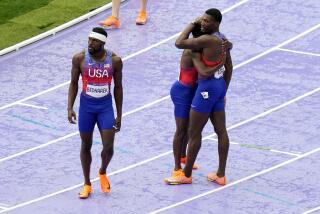Four-Man Sled Halfway Home on Medal Quest
- Share via
PARK CITY, Utah — Todd Hays was a man of almost no words Friday, but his silence spoke loud and clear. Hays had talked to the media through most of the Olympic Games, even after a mediocre first-day performance in the two-man bobsled left him in fifth place last Saturday.
Friday in the first two runs of the four-man competition at Utah Olympic Park, the American driver recorded the fastest times in both heats for a total time of 1:33.26. That gave him a .09-second lead over Switzerland’s Martin Annen and Germany’s Andre Lange.
Afterward Hays told an Olympic media liaison: “We have to concentrate on [today’s] races. I feel great. This is a four-heat competition, and we have two heats left to go.”
And after that elementary math lesson, he was gone. This sudden shyness was understandable, if only because U.S. Olympic bobsled competitors have proved repeatedly that they lose focus at their own peril. If Hays ever forgets that, two of the guys who sit behind him no doubt will provide helpful reminders.
Brakeman Garrett Hines and push athlete Randy Jones were on Brian Shimer’s sled in 1998 at Nagano when they missed a bronze medal by .02 of a second after the sled mysteriously lost speed just before the finish line. And Hines was Hays’ brakeman Sunday when they missed a bronze medal by .03 of a second despite strong runs in Heats 3 and 4.
Those misadventures stretched the U.S. men’s Olympic bobsled medal drought to 46 years. With a somewhat comfortable 0.38-second lead over fourth-place Christian Reich of Switzerland, Hays, Hines, Jones and Bill Schuffenhauer appear set to end that dry spell, but Hines has learned all too painfully not to count on that.
“We’re going to concentrate on each heat at a time,” he said. “Even though we’re excited and happy with our finish today, we know it’s not over by any means. It’s going to be a dogfight. That’s the way we have to look at it.”
The 32-year-old Hines, was so upset after just missing a medal in 1998 he quit the sport for a year and then switched pilots from Shimer to Hays. After Sunday’s near-miss, Hines was too upset to talk, and Friday he acknowledged he is tired of having a medal slip away.
“I want it real bad,” he said. “It means a lot of different things.”
One of them, he said, is that he and Jones would become the first African-American men to win a Winter Games medal. Tuesday, Vonetta Flowers of the U.S. became the first African-American athlete to win a Winter Games gold medal when she served as brakeman for Jill Bakken in the inaugural women’s bobsled event.
“To win any medal, let alone a gold, would be a big accomplishment for both of us,” Hines said.
Five-time Olympian Shimer and his crew of Mike Kohn, Doug Sharp and Dan Steele, were fifth in 1:33.65, which put them .3 of a second from a medal despite producing just the 17th-best start in their first run and the 12th best in Heat 2.
“Right now we’ve got to find some time at the start,” Shimer said. “Everything else seems to be working. This is my track. Nobody’s going to beat me down driving.”
Germany’s Christoph Langen, who won the two-man gold medal Sunday, was sixth in 1:33.68 after an uncharacteristically poor first run left him seventh. Langen also injured his left foot and was uncertain about his availability for today.
More to Read
Go beyond the scoreboard
Get the latest on L.A.'s teams in the daily Sports Report newsletter.
You may occasionally receive promotional content from the Los Angeles Times.






